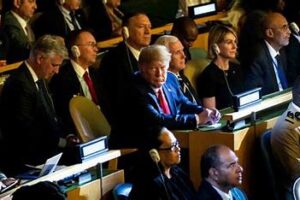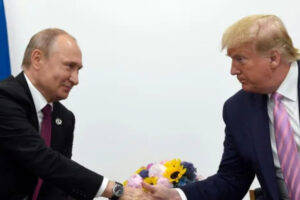A senior general has said the US wants to create an international military coalition to safeguard waters around Iran and Yemen.
Marine General Joseph Dunford said he wanted to “ensure freedom of navigation” in the region, which provides essential trade routes.
Last month the US blamed Iranian-backed fighters for attacks on two tankers.
Gen Dunford said the US was in talks with a number of countries who had the “political will” to support the plans.
The US would provide “command and control” ships, he said, but the aim would be for other countries to offer boats to establish patrol between those ships.
Gen Dunford said the US would “work directly with the militaries to identify the specific capabilities” each country has to support the initiative.
The Straits of Hormuz and the Bab al-Mandab are essential strategic marine locations, providing access from the ocean into the Gulf and the Red Sea.
The general said the size of the initiative depended on the number of countries which decided to take part.
“With a small number of contributors, we can have a small mission,” he said. “We’ll expand that as the number of nations that are willing to participate identify themselves.”
Everyday, nearly four million barrels of oil pass through the Bab-al Mandab to the rest of the world.
Why is the US so concerned about shipping?
The US accused Iran of attacking two oil tankers with mines in June, just outside the Strait of Hormuz – an accusation denied by Iran.
Days later, an unmanned US drone was shot down by Iranian forces in the Gulf.
Iran said it had violated Iranian airspace and would send a “clear message to America”. The US insisted the drone had been over international waters. President Donald Trump tweeted: “Iran made a very big mistake!”
The US planned for retaliatory air strikes, which were later cancelled.
Are we heading for a new tanker war?
Iran nuclear deal: Key details
Is it about to get more expensive to fill my car?
Iran has said it would close the Strait of Hormuz if it was unable to export oil, a sanction that US President Donald Trump has threatened to impose if Iran does not renegotiate a nuclear deal.
“Iran is not seeking war with any country, but we are fully prepared to defend Iran,” said Maj-Gen Hossein Salami, head of Iran’s Islamic Revolution Guards Corps, after the drone was shot down.
There have been growing tensions between the UK and Iran too, after Britain said the Iranian regime was “almost certainly” responsible for the attacks on two oil tankers in June.
US-Iran tension: Recent events
May 2018: US President Donald Trump withdraws unilaterally from the 2015 nuclear deal between Iran and six world powers, and begins reinstating sanctions to force Iran to renegotiate the accord. Iran’s economy slumps as they take effect.
2 May 2019: Mr Trump steps up pressure on Tehran by ending exemptions from secondary sanctions for countries still buying Iranian oil.
5 May: The US sends an aircraft carrier strike group and B-52 bombers to the Gulf because of “troubling and escalatory indications” related to Iran.
8 May: Iranian President Hassan Rouhani says Iran will scale back its commitments under the nuclear deal in retaliation for the sanctions, including by allowing its stockpile of low-enriched uranium to increase. Enriched uranium is used to make reactor fuel and potentially nuclear weapons.
12 May: Four oil tankers are damaged by explosions off the UAE coast in the Gulf of Oman. The UAE says the blasts were caused by limpet mines planted by a “state actor”. The US blames Iran, but it denies the allegation.
13 June: Explosions hit two oil tankers in the Gulf of Oman. The US again accuses Iran, releasing footage purportedly showing Iranian forces removing an unexploded limpet mine from a damaged vessel. Iran says the evidence is fabricated.
17 June: Iran says it will breach the limit on its stockpile of enriched uranium set under the nuclear deal on 27 June, unless Europe protects Iranian oil sales.
20 June: Iranian forces shoot down US military drone over the Strait of Hormuz.
4 July: Gibraltar, assisted by British Royal Marines, seizes Iranian oil tanker Grace 1 on suspicion of breaking EU sanctions on trade with Syria
Source: BBC






















